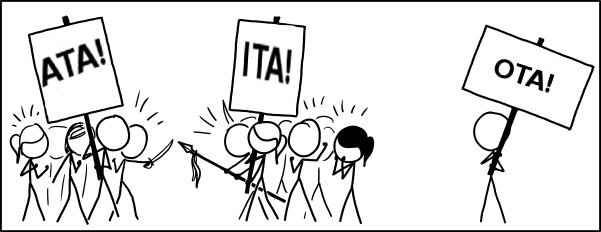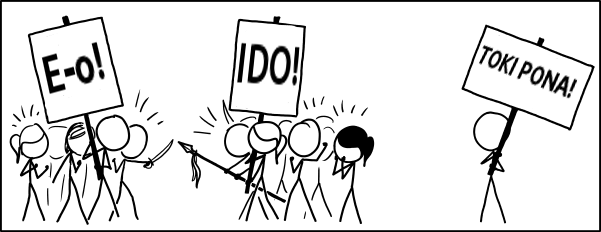Last weekend, I travelled by myself to Silver Bay for the Aŭtuna Renkontiĝo. In the past, Lucy usually went with me, but she's decided she doesn't want to travel so far -- at least not for Esperanto things. So I went by myself. I decided to stay in the Junulara Dometo (in spite of not being so juna). It was a pleasant experience. I particularly enjoyed the experience of being among a community of people engaged in meaningful activity, even if it was just preparing and sharing meals. I really enjoyed the peace and tranquility of the place.
The week, in spite of being short, was especially busy getting ready for the opening of a new exhibit for the collections celebrating William S. Clark. We had visitors coming in from Japan to see the exhibit and several of us worked at a fever pitch to pull it all together. My part was to arrange the technology to "take over" the projector that usually shows the "Molecular Playground" and instead have it offer a presentation of slides about William Clark and Hokkaido University. It got tied up with two similar projects that Geosciences wanted to do. There was a lot of back-and-forth trying to negotiate some payment for Tom to build the ones for Geosciences and help me.
A high point of week was my class where Dr. Alexander Suvorov presented briefly on terrestrial molluscs and then went into the field with us to collect some. I had picked out a spot that I thought would be good and it was: we found a bunch of examples to take back to the lab. We got to do all the pieces: collecting, looking at them under dissecting scopes, identifying them, and collecting some imagery. With the collections staff being so busy building the exhibit, I hadn't managed to get everything together ahead of time, so I had to go back the next day with alcohol to preserve everything. And today made up some labels. It looks like what will work best is to start building a reference collection: the students should be able to use the examples we have so far to recognize things we've seen and set aside things we haven't to get additional help from Sasha. It was a tremendous high to have everything come together so well.
Last night, we had a reception for the guests visiting from Japan. I was able to attend briefly -- just long enough to give each of the visitors a copy of one of my books of haiku. When I mentioned haiku, one of them expressed great surprise and interest. They seemed appreciative and I hope they enjoy them.
I had to run from the reception because the Annual Meeting of Amherst Media was happening later. I joined the board of Amherst Media over the summer. At the Annual Meeting, we needed to elect new board members and hand out an award. The Jean Haggery Award for Community Engagement was given to Josh Wolfsun and the Student News directors including Charlie. I got to see him stand up and receive a plaque and stand with the others to reflect on and be recognized for their accomplishments. I was very pleased to see something he'd worked so hard for receive the recognition it deserved.
Much of yesterday and today, I spent organizing my Annual Faculty Review -- a particularly odious task. I had a huge number of things to list this year, which made it somewhat less unpleasant than usual. Drupal Camp, Interim Director of the IT Program, the ICT Summit, Hack for Western Mass, the Summer Institute for Scientific Teaching, the Learning Spaces Collaboratory. It was a busy year last year. It was a relief to get it turned in on time.
This evening, Lucy and I watched the Cardinals take the pennant. I'm not much of a baseball fan, but I enjoy watching the games with Lucy. And the game tonight was a real treat: they scored 9 runs while holding the Dodgers scoreless. It was almost enough to make you feel sorry for the Dodgers. Almost.
Tomorrow, I have another road trip, but this time with friends. I'll meet Buzz, Julian, Phil, and Annie for a trip up to Vermont to look for Heady Topper. We were crushed to see that the brewery is sold out for the weekend, but as Buzz points out, there is plenty of other craft beer in Vermont worth exploring. And other places that may have Heady Topper for sale.



